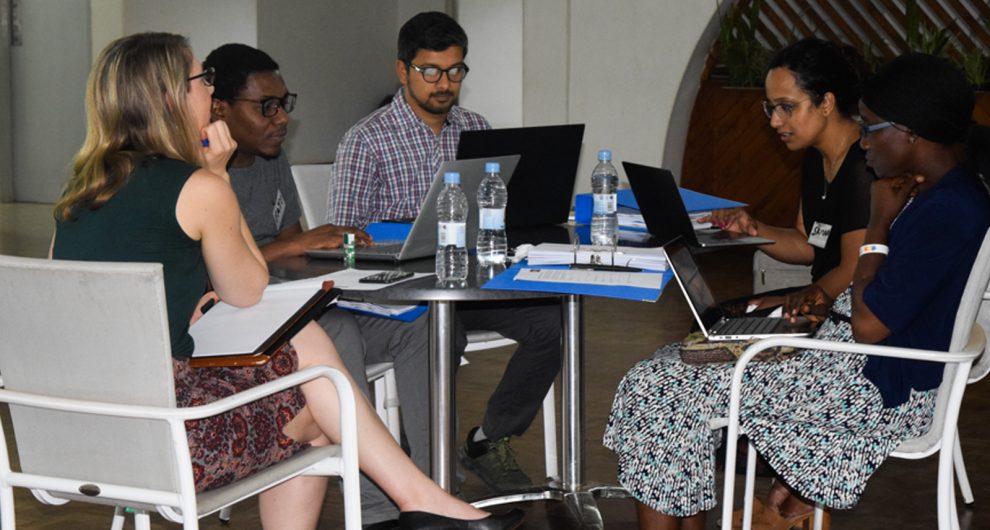Policy Communication Fellows Programme

The aim of the Policy Communication Fellows Programme is to develop the next generation of leaders from the less developed world regions who will shape policy in their countries, regionally and globally. The programme is jointly hosted by the Population Reference Bureau (PRB) and the African Institute for Development Policy (AFIDEP). While the programme was established by PRB in 1989 and has been ongoing since then, AFIDEP has partnered with PRB since 2018 to deliver the programme.
Through this programme, Fellows learn, firsthand, local advocacy priorities and policy landscapes and how to tailor their research messages to relevant policy audiences. Fellows are mentored throughout the programme on different strategies to effectively communicate their findings to non-technical audiences. The Policy Fellows programme is committed to providing an enriching, cutting-edge experience for participants that reflects the diverse and constantly evolving landscape of policy and communications.
The year-long fellowship programme engages participants through a blended learning approach. Fellows are required to attend a week-long training workshop, complete instructional curricula online, and submit assignments throughout the fellowship.
The goals of the Policy Communication Fellows programme are to:
- Understand the process by which research informs the policy environment.
- Learn how to communicate research to policy audiences in compelling ways that encourage action.
- Improve participants’ communication skills using a variety of formats and platforms.
Target Population
The programme is open to individuals from developing countries supported by USAID Population funding and currently enrolled in academic institutions pursuing doctoral programmes and who are between their 3rd and 5th year of studies.
Additionally, developing country applicants may be in any field of study but their research focus must be related to one or more of the following:
- Family planning and/or reproductive health (FP/RH).
- Contraceptive use/behaviour.
- Maternal and child health (MCH), specifically family planning/MCH integration.
- Population growth.
- Adolescent reproductive health.
- Poverty, health equity, and connections with reproductive health.
- Gender issues, specifically gender-based violence (GBV), early marriage, and male engagement in family planning.
- Population, health, and environment interrelations.
Approach
The programme has 3 components:
- Online Coursework: Throughout the year-long fellowship, Fellows are required to attend short online lectures and complete associated assignments to supplement the in-person training. Fellows are expected to join one orientation webinar prior to the summer institute, as well as attend post-institute online lectures throughout the year.
- Summer Institute: Fellows attend a week-long policy and communication workshop focused on the role of research in the policy process and on techniques for effective communication of research findings to decisionmakers. At the summer institute, Fellows interact with AFIDEP and PRB experts as well as other local experts active in policy research and communication. During the training, participants are asked to work with their own research data to identify the policy relevance of their findings. Fellows also learn how to draw implications of those findings and how to communicate them effectively to policy audiences through a variety of platforms.
- Policy Communication Assignments: Fellows apply the skills learned at the workshop to prepare written assignments and an oral presentation for policy audiences, based on their dissertation research during the summer institute. Throughout the assignments, Fellows receive individual feedback from policy communication experts on their work.
- 410 fellows, from Malawi, Uganda, Kenya, Haiti, Pakistan, Bangladesh, India, Nigeria, Ghana and Ethiopia among others, trained since the programme started in 1989
- Fellows making an impact on policy in various countries, attributed to the skills learned through the programme
- Alumni have gone on to lead international organisations such as the AFIDEP Director
- Shaping the way researchers engage with policymakers, thereby bridging the gap that often exists between the two.
- Transformation in the way researchers communicate their findings to policy audiences, contributing to notable mindset shifts.
FEATURED VIDEOS
Testimonials
https://www.youtube.com/watch?v=e4ZM9XXoSQM&t=133s
Stories
The Policy Communication Fellows Programme is a partnership between Population Reference Bureau (PRB) and AFIDEP with funding from the U.S. Agency for International Development (USAID).
Key Details
| Dates: | June 2018 to Present |
| Aim: | The aim of the Policy Communication Fellows Programme is to develop the next generation of leaders from the less developed world regions who will shape policy in their countries, regionally and globally. The programme is jointly hosted by the Population Reference Bureau (PRB) and the African Institute for Development Policy (AFIDEP). |
| Where: | Ethiopia , Ghana , Kenya , Malawi , Nigeria , Uganda |
| Project Manager: | Bernard Onyango |
Related Items
Related Events
Feb 2022
Sep 2020

